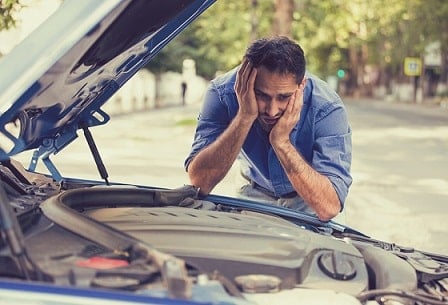A car engine is a machine that converts various forms of energy into mechanical force.
It also controls the general performance of a vehicle. It comprises a cylinder, piston, connecting rod, and crankshaft. For it to function, it must have fuel to burn, air to enhance combustion, and an ignition source to start.
There are two main types of engines, namely, two-stroke and four-stroke. As their name suggests, a two-stroke engine completes a power cycle with two-piston strokes, while a four-stroke completes a power cycle with four-piston strokes. You can reduce and avoid engine issues with proper maintenance. Engine failure can prevent you from enjoying rides since it can make your car stop for good. Continue reading this article to learn about the most common engine problems.
Types Of Engines
Engines are classified into four groups, petrol, hybrid, gas, and diesel. Petrol engines are primarily suitable for fun travel and better tolerated in cities. The diesel engine is the best choice if you use your car regularly and over long distances. It also has essential gauges which can warn you about the damage that is likely to happen to your engine. Make the use of EGT diesel sensors and prevent your engine from overheating.
Hybrid electric engines reduce fuel consumption since they can boost the combustion engine when starting and accelerating. It’s very easy to use and very flexible. It also has a tiny battery that doesn’t require recharging. Gas engines use natural gas, such as methane, which can be wholly decarbonized. They are more economical and environmentally friendly, which helps preserve the planet.
Thus, below are some issues that can affect your engine’s performance.
- Poor Lubrication
It’s crucial to ensure that your engine is well-lubricated. Improper lubrication can lead to unwanted friction inside the machine leading to overheating. Many think overheating occurs due to high temperatures but can also be experienced during low temperatures. Most vehicles have temperature gauges or warning lights that warn you about overheating. You can prevent overheating by keeping the coolant levels moderate or frequent servicing.
Mainly, overheating occurs due to damaged or broken thermostats, dirty or low coolant levels, and a failed radiator hose. Therefore, you must service your car frequently, take advantage of the oil change, or have your radiator flushed and refilled. Also, lubrication enhances the cooling of moving parts like pistons and shaft bearings.
The most frustrating car engine issue can leave you confused and cancel the planned trip. Your engine can fail to start for various reasons, such as a dead battery, fuel problems, engine problems, alternator problems, or engine intake issues. If your battery is new and the car fails to start, the problem could be in the starter. Remember, it’s the starter that enables motion. Therefore, if damaged, your vehicle will not start.
Become your mechanic and make it a routine to keep a set of tools in your trunk. Nevertheless, you can enjoy a ride without these tools if your car won’t start.
If you try to start your vehicle and it clicks, cycle the key or try tapping on the battery terminals. You can tap the starter but shift the shifters if you don’t hear the clicking sound when you turn the key. You can as well jump start your car, and if it still fails to start, look for a mechanic but ensure your engine is inspected regularly.
- Prolonged Engine Detonation
Suppose you are driving your car, and you hear knocking sounds. The chances are that there is a lot of heat in the combustion chamber. Overheating and extreme pressures can result in engine detonation, destroying pistons, head gaskets, and piston rings. Knocking sounds are brought by a loose timing chain, low engine oil, or a lousy oil pump.
You shouldn’t relax if you hear any noise, such as rattling, popping, and spitting, coming from the engine, but instead, contact your mechanic to prevent engine breakdown.
A failed oil pump results in improper engine lubrication. And lack of engine lubrication is caused by insufficient oil. It causes parts of the engine to wear, leading to failure. Ensure the engine oil is light enough to flow fast through the pumps. Unnecessary friction caused by a lack of adequate lubrication can lead to high temperatures in the engine, thus failing the oil pump.
Conclusion
The engine is the heart of every vehicle. Improper maintenance can deny you the right to enjoy a ride even if you own a car. Therefore, it’s vital to service your engine regularly to keep your vehicle moving. Above are some of the issues that commonly affect your engine.
Register free for IMEX Frankfurt May 23-25 AND click here to schedule your FREE Photo / Video Interview with eTurboNews during IMEX




